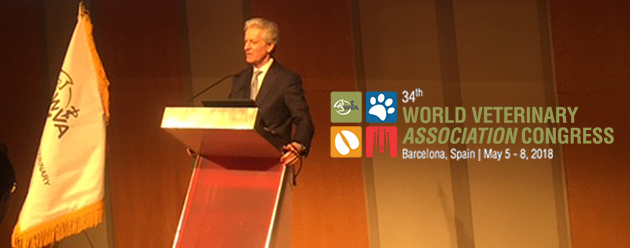
The Future of Veterinary Care
May 29, 2018
An Editorial by Juan Ramón Alaix, Chief Executive Officer, Zoetis
As CEO of Zoetis, I have enormous respect for veterinarians and the contributions they make to society by caring for animals – animals that we all may depend on for companionship and nutrition. Their commitment to animal health is supported and shared by all of our Zoetis colleagues, so I was honored when the World Veterinary Association asked me to deliver a keynote address to 500-plus veterinary professionals this month in Barcelona. This was a great opportunity to discuss the forces shaping the future of animal health, and more importantly, how veterinary care will evolve to address the world’s most pressing animal health issues.
I believe the role of the veterinarian will be even more critical going forward, when you consider the increasing demand for protein fueled by a growing world population; the expanding middle class and its desire for more pet companionship and diets rich in animal proteins; the consolidation of food production to support large urban centers; and the need for better healthcare protocols to ensure safe and affordable food supplies. All of this means that our dependence on animals will be even greater in the future.
There are many trends influencing how veterinarians – and partners like Zoetis – will help raise and care for healthy animals to meet these demands in the future. These trends include:
- The evolving threat of emerging diseases that endanger the health of farm animals, and the ability to produce more protein in the face of climate changes and constrained natural resources.
- The growing influence of consumers – who are better informed and connected than ever before -- when it comes to food production and their pets’ health and wellness.
- The advancement of digital tools and data analytics becoming even more important for veterinarians to ensure accurate, targeted treatment, deliver more personalized care and better connect with their customers.
I am convinced that by embracing many of these developing trends, technologies and innovations, veterinarians will remain at the center of Animal Health for years to come, and I see four opportunities in particular:
First, veterinarians must take a more integrated approach to care. At Zoetis, we invest in innovation across the full spectrum of care for animals – from prediction and prevention to detection and treatment – and we work with veterinarians to help them expand their tools beyond traditional medicines to also include the ways genetics, diagnostics, digital innovation and data analytics can improve animal health. By using good prediction and prevention tools on the front end through vaccines and genetic testing, followed by diagnostic and digital tools to monitor animal health, veterinarians can help reduce the use of antibiotics – whether it’s cattle or canines – and ensure timely and targeted treatment on the back end of this cycle of care.
Second, veterinarians can also transform their practices – and increase traffic – through big data and digitalization. Digital pet wellness applications are connecting pet owners with their local vet practice, while capturing nearly every aspect of their pet’s life. This enables veterinarians to ensure the best professional advice and care. I am also inspired by the increasing number of veterinary practices now using social media channels to stay present and relevant to a new generation of pet owners. It’s important for veterinarians to be proactive in the “internet of things” to maintain their influence in healthcare – and to avoid other external players replacing them – not only as prescribers, but also in delivering products, services and advice to customers.
Third, there is the opportunity to expand our global access to technology through sustainable business and economic models. One way to achieve this is through broad collaborations. For example, in some African markets – which are home to some of the largest livestock populations in the world – we are making great progress in establishing access to local veterinary services, diagnostics, medicines, vaccines and other animal health products through a collaboration with the Bill & Melinda Gates Foundation. Initiatives like this can improve medicalization rates, minimize the incidence of disease, and strengthen local veterinary expertise in areas where it does not exist today. In turn, this can greatly improve the livelihoods of local farmers.
Finally, I am encouraged by efforts to elevate the veterinary profession – by collaborating with professionals and academia to raise the standards of veterinary education, modernize treatment, and grant wider, more affordable access to veterinary care.
Ensuring the best possible health outcomes for animals is a tall order. For many veterinarians, it is much more than a profession… it’s a passion to which they have dedicated their lives. I am proud of what we at Zoetis are doing in partnership with veterinarians to bring greater value to society – through new medicines, technologies and insights that can improve the health and wellness of animals; enhance the sustainability of animal agriculture; promote the veterinary profession, and advance the level of veterinary care around the world.